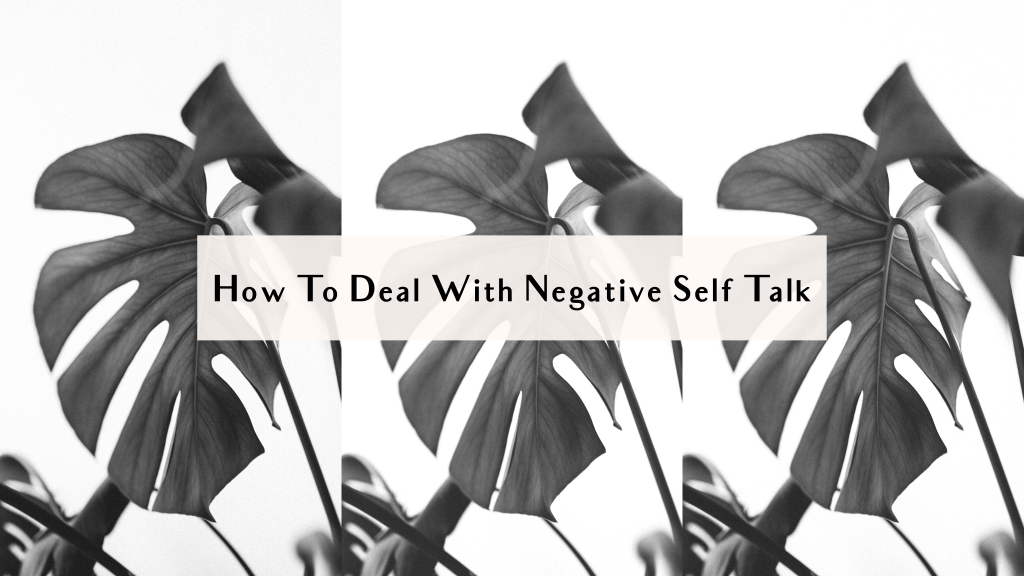This post talks about how to deal with negative self-talk.

Have you ever noticed how one negative thought can snowball into a loop of negativity that seems to have no end?
Negative self talk truly is destructive for our well-being and our growth. But with the right tools and approach, you will come out better on the other end.
Let’s look at how to become a more centered person who won’t get dragged into an endless loop of negative thoughts.
Recognize that you are not your thoughts
When you get caught in negative self talk, it’s essential to go back to this truth: I am not my thoughts. Your mind is simply playing a tape of past trauma, rejection, or hard feelings.
Approach negative self talk with the attitude of a curious questioner. Why exactly do I feel like I am failing? Because x and x didn’t work out? Is that reasonable? Why do I feel not enough? Because x and x said so?
If your negative self talk goes back to what people said, please know that those people were not in their right mind. People who are in their right minds don’t go out hurting other people.
Most of what other people say is an illusion, yet we take it on as truth and carry it throughout our lives.
Get out of your head, literally
Negative self talk is the worst when we’re sitting still. Get out of this thought loop by moving your body. Pilates, yoga, slow and nourishing movements are the best when you’re battling negative thoughts.
Exercise in general works, but there’s something more integrative about slow movements. Running on the treadmill exhausting ourselves might silence negative thoughts for a moment, but they usually come back soon afterward.
Write it out
Negative thoughts have power because they are abstract. But how well do they hold up when we start writing out the facts?
Take away the power of negative thoughts by writing them down. This can be super confronting because it feels safer keeping them inside our minds. Big mistake! That’s how thoughts keep their power because we don’t examine their truth.
Even if your negative self talk seems a blur of unfinished thoughts, write them on paper.
Negative thoughts aren’t necessarily true. List as many facts that you can think of that prove the opposite of your negative self talk. Big or small, it doesn’t matter:
Negative self talk examples
I am a failure because things don’t work out
- I am not a failure because I am trying new things; failure is just part of that journey
- Things are working out for me all the time (I got this job just in time, I met this cool person, etc., etc.)
- I’m building a business, and that takes courage
- I have acquired these skills (list)
After debunking negative thoughts with facts, you need to have a replacement thought ready for the negative thought.
Replacement thought examples:
I am a failure because things don’t work out > I am taking one more step towards success every day.
I will never find the right person > Who is for me will find me.
I look awful > I’m getting better at taking care of myself every day.
When you catch yourself thinking a negative thought, say “cancel,” and repeat the replacement thought.
Be vigilant about your replacement thought, and never underestimate the power of reprogramming your mind.
Can negative thoughts bring something positive
Although negative thoughts are useless for the most part, it’s worth examining them. Which thoughts are most repetitive? Do they contain any truth? Is there something you should be doing which you don’t?
Negative thoughts can point us where we need to do work, but they should not be the fuel for changing.
The motivation that comes with negative thoughts isn’t long-lasting. It also has the shadow side: when we finally achieve the thing our negative thoughts said we couldn’t, it will not feel satisfying.
Our motivation to bettering ourselves needs to come from a deeper place if we want it to last.
How to stop negative self-talk
When negative thoughts creep in, your first instinct might be: I need to stop this! Funny enough, opposing negative thoughts only makes them persist.
Witness your thoughts instead of disappearing with them.
When you stop identifying with your thoughts as if they were the truth, the negative self talk will dissolve on its own.
You don’t need to do so with force. If you want to learn more about this important concept, read the book The Power of Now by Eckhart Tolle.
Negative thoughts and anxiety
When you are anxious, you are not rooted in yourself. Dealing with anxiety and negative thoughts requires a daily practice that keeps you grounded.
I recommend doing some slow movement, like yoga or pilates, and finishing your practice with meditation.
People always recommend meditation for anxiety, but I think that’s too big of a bridge to cross when you’re feeling super anxious.
By moving your body, you shift your attention from your mind to your body. After a 20 minute workout, it will be much easier to meditate.
I highly recommend Soul of Healing Affirmations by Deepak Chopra for meditation and rooting back into yourself.
For moving my body, I love Melissa Wood Health yoga and pilates flows. It’s like an instant de-stress formula.
What works for you is deeply personal, and it’s so important to try out many things!
Aside from having a practice that roots you back into yourself, away from anxiousness and destructive thoughts, spending time alone is essential.
People who experience a lot of anxiety are by default easily overstimulated.
Being by yourself, in a space unspoiled with the energy of others, is crucial to staying grounded and calm.
Notice what makes your negative thoughts get worse
Mastering negative thoughts is also about knowing in which environment your negative thoughts thrive. When do you have the most negative thoughts? Food, alcohol, and particular people can make negative thoughts worse.
The day after drinking alcohol, my negative thoughts spin out of control quickly. Food that is hard to digest? Same thing.
When it comes to people, I recently heard this concept explained beautifully by Lalah Delia. Calling people’ toxic’ isn’t necessarily a negative statement about who they are. It’s simply referring to the chemistry between you both.
Some people will foster positive feelings, nourishment, and support within you. Other people will wreak havoc in your nervous system and trap you in destructive thought loops and forms of attack.
If you’re someone who analyzes their contribution to a toxic interaction with someone, I salute you. It’s great that you’re self-aware. However, even if you’re at fault, too, you’re perfectly allowed to exit a relationship that doesn’t work for you.
Where does negative self-talk come from
If negative self-talk is an onion, at the very core of it, you will find trauma. Contrary to what we might think, trauma is not only reserved for people who went through extremely traumatic circumstances. Trauma is a part of life.
If you’re alive, you probably carry with you some trauma. Trauma is a collection of unprocessed feelings and can be triggered by rejection, failure, a breakup, or something somebody said years ago.
Negative self-talk feasts on unprocessed feelings and loves to use them against us.
Also, know that trauma doesn’t have to do much with “facts.” It’s about how we’ve experienced events, which is deeply personal. People, without exception, are fragile creatures.
The way out
The way out of negative self-talk is slowing down and becoming more conscious of what’s going on within you. If you constantly bypass your feelings, you can almost guarantee you will receive negative thoughts in return.
There isn’t a simple step-by-step plan to stop negative self-talk. We think we can control it, just as we do with many other things in our life.
But transforming negative self-talk doesn’t need control, but our surrender and a new way of being in the world.



Leave a Reply